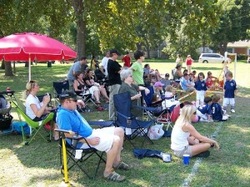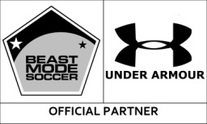If parents have been acting as your assistants during soccer training drills, it is not uncommon for them to want to continue to participate during games. This is something you need to supervise closely, for several reasons.
First, if other parents see a “non-coach” giving instructions to players on the field, they are going to be tempted to start doing this themselves. This will drive the kids crazy, because “too many cooks” really do spoil things.
Second, most parents are going to be watching their own child - and giving most of their instructions to their own child. This can be very distracting to the child (even if the instructions are good) because it takes his attention away from the game and keeps him from using his own brain to figure things out for himself.
Furthermore, many children simply want praise, praise and more praise from their parents - so any corrections will be viewed as a public statement of “Boy, you are so stupid, I hate having you as my kid.”
Finally, and often most importantly, the instructions being given by these “helpers” often tends to be completely wrong – and exactly the opposite of what you have been working on during your soccer drills.
Communicate your coaching approach
What to do? An important soccer coaching tip is to be tactful - and hold a pre-season meeting. Explain to the parents that the kids need to be able to use the games as learning experiences – and too much criticism is going to feel that the parents view them as failures.
Tell the parents that, on game day, the ONLY thing that you want to hear is some general praise “Nice job, good shot, unlucky, good idea, etc.” Tell your assistants that you really appreciate their help, but you need them to sit in the stands on game day, because you are afraid that other parents will be tempted to start “helping” by shouting instructions - and this will drive the kids nuts!
No coaching zone
If you have a parent who starts to give instructions, nip this in the bud early. Each time that the parent does this, smile and say “Remember the Rule, please.” Be good humored about it. Make a sign which proclaims the stands as a NO COACHING ZONE. Bring a gag. But, don’t permit this parent to violate your rules.
The same goes for parents who want to yell at opposing players or referees - except that you MUST leap in hard to prevent this. A very firm “George, we don’t yell at the Refs” - followed by “Sorry, Ref, it won’t happen again” - makes it clear to everyone that you don't like this conduct.
Clamp down on shouting at opponents
The same goes for yelling at opposing players, but be even more forceful. It is very scary for smaller players to deal with irate adults – and you need to stop this immediately. If the parent doesn’t listen, tell him to go and sit in his car.
Even if this means abandoning the game, or going to get a club official to help, it is your obligation to protect these other children - just as you would want the other coach to protect your little ones.
Besides, if you do not move in quickly, the next thing that you know, you will have some irate Dad from the other side coming to see your parent - and all hell could break loose. So, do what you need to do - but don’t tolerate this type of behavior.
First, if other parents see a “non-coach” giving instructions to players on the field, they are going to be tempted to start doing this themselves. This will drive the kids crazy, because “too many cooks” really do spoil things.
Second, most parents are going to be watching their own child - and giving most of their instructions to their own child. This can be very distracting to the child (even if the instructions are good) because it takes his attention away from the game and keeps him from using his own brain to figure things out for himself.
Furthermore, many children simply want praise, praise and more praise from their parents - so any corrections will be viewed as a public statement of “Boy, you are so stupid, I hate having you as my kid.”
Finally, and often most importantly, the instructions being given by these “helpers” often tends to be completely wrong – and exactly the opposite of what you have been working on during your soccer drills.
Communicate your coaching approach
What to do? An important soccer coaching tip is to be tactful - and hold a pre-season meeting. Explain to the parents that the kids need to be able to use the games as learning experiences – and too much criticism is going to feel that the parents view them as failures.
Tell the parents that, on game day, the ONLY thing that you want to hear is some general praise “Nice job, good shot, unlucky, good idea, etc.” Tell your assistants that you really appreciate their help, but you need them to sit in the stands on game day, because you are afraid that other parents will be tempted to start “helping” by shouting instructions - and this will drive the kids nuts!
No coaching zone
If you have a parent who starts to give instructions, nip this in the bud early. Each time that the parent does this, smile and say “Remember the Rule, please.” Be good humored about it. Make a sign which proclaims the stands as a NO COACHING ZONE. Bring a gag. But, don’t permit this parent to violate your rules.
The same goes for parents who want to yell at opposing players or referees - except that you MUST leap in hard to prevent this. A very firm “George, we don’t yell at the Refs” - followed by “Sorry, Ref, it won’t happen again” - makes it clear to everyone that you don't like this conduct.
Clamp down on shouting at opponents
The same goes for yelling at opposing players, but be even more forceful. It is very scary for smaller players to deal with irate adults – and you need to stop this immediately. If the parent doesn’t listen, tell him to go and sit in his car.
Even if this means abandoning the game, or going to get a club official to help, it is your obligation to protect these other children - just as you would want the other coach to protect your little ones.
Besides, if you do not move in quickly, the next thing that you know, you will have some irate Dad from the other side coming to see your parent - and all hell could break loose. So, do what you need to do - but don’t tolerate this type of behavior.


 RSS Feed
RSS Feed

